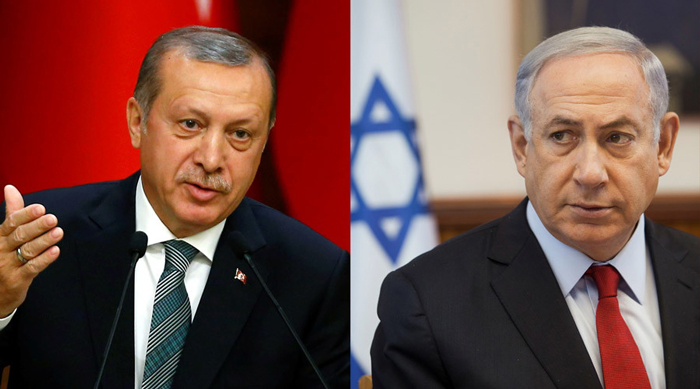Will Israel’s new frigid peace with Turkey last? And can Erdogan be trusted?
Michael Rubin
Turkey and Israel this summer formally ended a six-year-long deep freeze in relations, and Turkish-Israeli ties are again flourishing. But there is reason to worry that it won’t be like the good old days.
The chill started on May 31, 2010, when Israeli commandos intercepted a flotilla of ships seeking to break Israel’s blockade of Hamas in the Gaza Strip. Israeli forces stopped five ships without incident, but on the sixth, a Turkish-owned vessel named the Mavi Marmara, Turkish activists resisted. In the fight that followed, Israeli forces killed eight Turkish nationals and one Turkish-American.
Turkey’s then-prime minister (now president) Recep Tayyip Erdogan was apoplectic. “It should be known that we will not stay silent and unresponsive in the face of this inhuman state terror,” he declared later that day. He demanded that Israel apologize, compensate the families of those killed and lift the blockade of Gaza; otherwise, Turkey would use its diplomatic leverage to isolate Israel on the world stage.
Erdogan was true to his word. For six years, relations remained mostly frozen. Turkey blocked Israeli military overflights of Turkish airspace and vetoed NATO intelligence sharing with Israel. Erdogan accused Israel of “systematic genocide” against Palestinians. In 2013, Turkey may even have betrayed Israeli spies working to counter Iran’s nuclear program.
The diplomatic rupture was all the more dramatic juxtaposed against history. Turks historically took pride in their role protecting Jews who were fleeing persecution. For generations, Turkish schoolchildren learned that Jews were among the few constituent groups of the Ottoman Empire never to rise in revolt. In 1949, Turkey became the first Muslim-majority state to formally recognize Israel. Turkey also traditionally saw itself as sharing values with Israel: The two nations were on the same side of the Cold War, and they shared intelligence to thwart terrorist challenges.
Does the rapprochement mean a return to this rosy status quo ante? Or does it simply delay another, inevitable rupture? Israeli Prime Minister Benjamin Netanyahu explained that Israel’s concessions in the reconciliation deal—including an apology and compensation to be paid to some victims—were worth the price. “The rift between us didn’t benefit our shared interests and had prevented us from cooperating on important things,” he said.
But some skepticism is in order. If those “important things” were economic—trade, tourism, gas and water deals—Israel’s apology should have been irrelevant. After all, even during the chill, trade between Turkey and Israel blossomed, doubling to $5.6 billion between 2010 and 2015. Nor did the deal win Israel diplomatic favors. As it turns out, it is Turkey, not Israel, that has become isolated in the last few years. While Israel has made diplomatic inroads with India, Southeast Asia, Egypt and even Saudi Arabia, Erdogan has made himself persona non grata not only in Syria and Iraq but also in Egypt, Libya, Saudi Arabia, the United Arab Emirates and even the Palestinian Authority, which resents his embrace of Hamas.
Rapprochement for its own sake might be the standard for diplomats, but this case is different: It throws a lifeline to a diehard enemy of Israel and undercuts Israel’s longer-term strategic position. Erdogan is deeply anti-Semitic and has incited Jew-hatred at every opportunity. In 1974, he wrote and directed a play depicting Judaism, Freemasonry and communism as the three evils threatening the world. Newspapers close to his party—Yeni Safak and Yeni Akit, for example—have become cesspools of anti-Semitic conspiracy theories. The Protocols of the Elders of Zion is sold in ministry kiosks, as are pamphlets depicting the modern secular nation’s founder, Mustafa Kemal Atatürk, as a closet Jew. Turks are fed a steady stream of anti-Semitic and anti-Israel incitement on state television and radio.
But doesn’t Erdogan’s well-documented hatred of Jews and Israel make the deal all the more impressive? Again, no. Erdogan sees utility in deals only so long as they conform to his interest. He has purged some of his closest allies for slights real and imagined. He turned with a vengeance on another onetime ally, Fethullah Gülen, an Islamist thinker who preaches peace but whom Erdogan now considers a terrorist, and rounded up 100,000 of his followers in the wake of the failed July coup, which he accused Gülen of fomenting. He was willing to seek peace with Turkey’s Kurds until he believed he could gain more by turning on them. On Syria, he has gone from vacationing with Bashar al-Assad to smuggling weaponry to the Islamic State to at least nominally fighting both. His reversals with Russia are dizzying.
So what is the future of his relationship with the Jewish state? Erdogan has changed Turkey forever. Since his brutal crackdown in the wake of July’s failed coup, he has dominated all branches of government and the military. But even as he has consolidated control, he has the support of no more than 50 percent of the electorate; Turkey remains divided between traditional Muslims, not all of them sympathetic to Islamism, and the urban, secular elites.
Even when Erdogan is gone, he will leave behind a civil service crammed with his cronies. Many hate Israel with a passion; for them, Turkey’s patronage of Hamas is the new normal. Erdogan’s successors might deal with Israel if the money is right, but when the need arises to rally their forces, inciting sentiment against Israel—as Erdogan did in a pre-planned rhetorical ambush of the late Shimon Peres at Davos in 2009—may well be their strategy of choice. As Turkey flirts with Russia and China, military cooperation might lead to intelligence leaks that would undermine Israel’s relations with the United States and NATO. So long as Erdogan is alive—and then for a generation more—Israel should expect no more than a frigid peace with Turkey, one replete with the potential for betrayal at any moment.
Michael Rubin is a resident scholar at the American Enterprise Institute.

